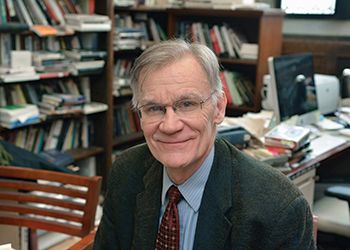Deep Connections
As an award-winning biographer of Frederick Douglass and a professor of history at Yale, David Blight sees the long roots of the United States’ present circumstances reaching back to the history of the Reconstruction period

David W. Blight, ’71, ’76, College of Social Science, is an academic supernova, a historian who won both the Pulitzer Prize and the Bancroft Prize in 2019 for “Frederick Douglass, Prophet of Freedom,” his definitive biography of the nineteenth-century intellectual and abolitionist.
Blight, who grew up in Flint and is now the Sterling Professor of History at Yale University, recently recalled how MSU fostered his metamorphosis from working-class kid to professor. “That’s where I confirmed that I wanted to be a history teacher,” he said from his book-strewn office.
Almost any issue we are living through now—race, the Constitution, what it means to be an American—can be seen through his life
Though Blight has lived in the East for nearly three decades, his roots are still in Michigan. As he tells undergrads in his Civil War and Reconstruction course, “We are all where we are from.”
Growing up in a trailer park “on the wrong side of the tracks,” Blight decided early on not to follow his father into factory work. Neither of his parents attended college, but his older brother was enrolled. “He was somewhat of a model for me,” he said.
MSU was nearby and affordable—barely. It cost $250 a term when he enrolled in 1967. Two events during his years there marked turning points in his life. In his junior year, the baseball coach abruptly cut him from his pitching position. He was devastated, but soon decided to get serious about his studies. Being cut turned out to be one of the “lucky breaks” in his life, he said.
Current events also played a formative role. “I came of age with huge issues. Race and civil rights and the Vietnam War were transforming society,” Blight said. He joined the anti-war movement, and confirmed his choice of vocation. “I thought being a history teacher was the coolest thing in the world.”
Growing up with a picture of Franklin D. Roosevelt on the dining room wall and a mother who was a “dyed-in-the-wool liberal” provided the foundation of his political philosophy, Blight said. “It was Vietnam, civil rights and my mother.”
After graduation, he returned to Flint to teach high school while taking night classes at MSU toward his master’s degree. He later turned his early interest in Douglass into his doctoral thesis. Of the more than a dozen books he’s written or edited, five focus on Douglass.
“Almost any issue we are living through now—race, the Constitution, what it means to be an American—can be seen through his life,” said Blight, who spent six months promoting his new book and still travels nearly weekly to give talks.
“He lived all these issues. He’s also possibly the most profound example we’ve ever had of someone who was led by words. He was a genius with language.”
Blight’s lifelong interest in Douglass was rekindled when he gave a lecture in Savannah, Georgia, and learned of a local man’s collection of materials on the last third of Douglass’ life. The biography sparked when Blight realized some of the information had never been made public. The book comes amid renewed interest in the Reconstruction, from 1865 to 1877, when President Andrew Johnson clashed with the post-Civil War Congress, which had passed laws granting equal rights to African-Americans.
“It was happening before Trump but he has enhanced it, because the issues are still alive,” he said. “The issues of Reconstruction have never gone away, whether they are about race or about federalism, the Constitution or the nature of our politics.”
Contributing Writer(s): Anne M. Hamilton



